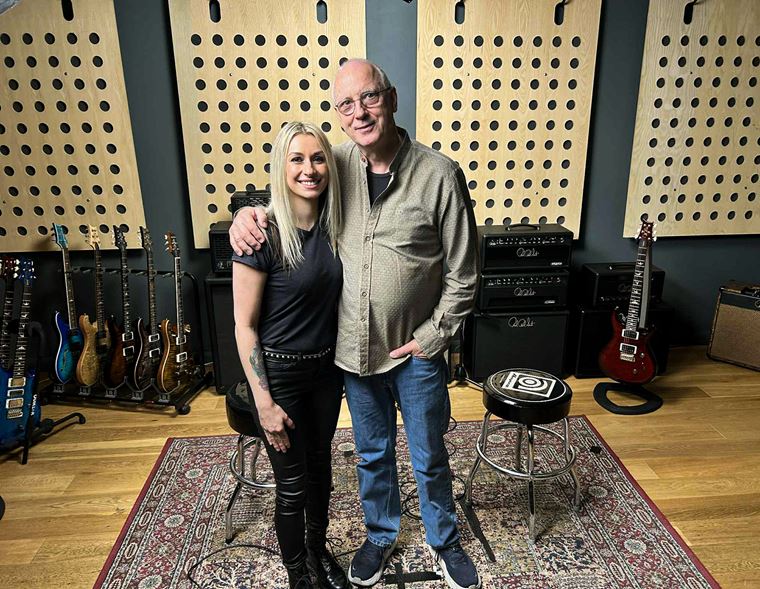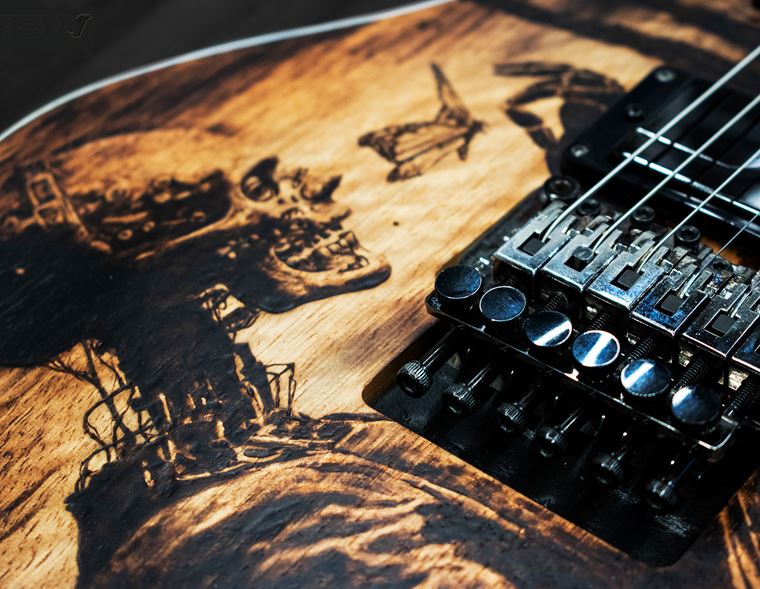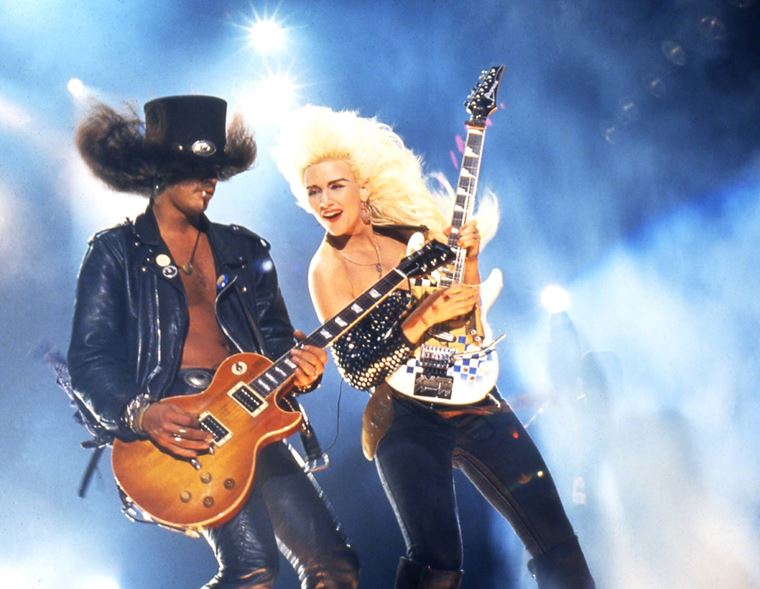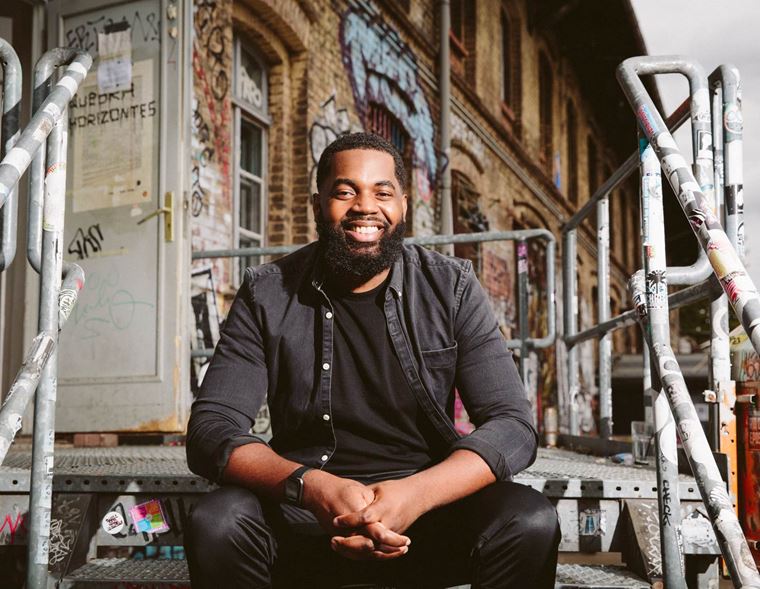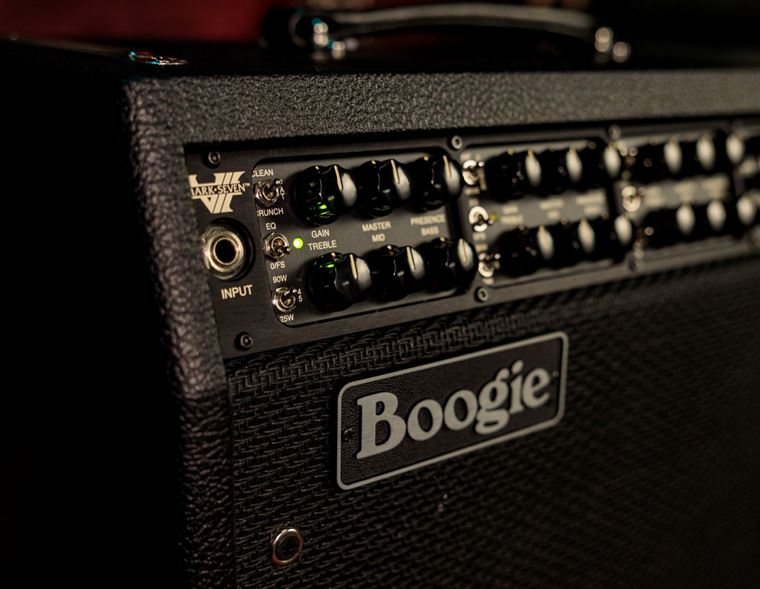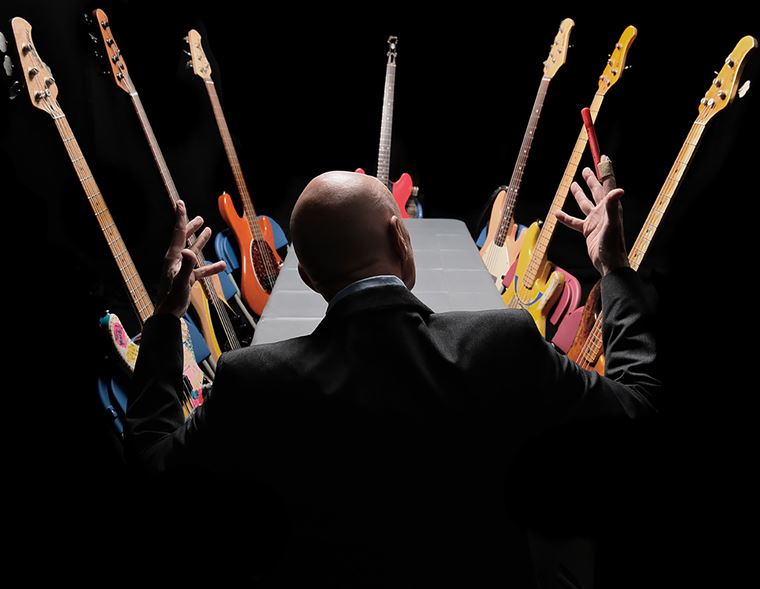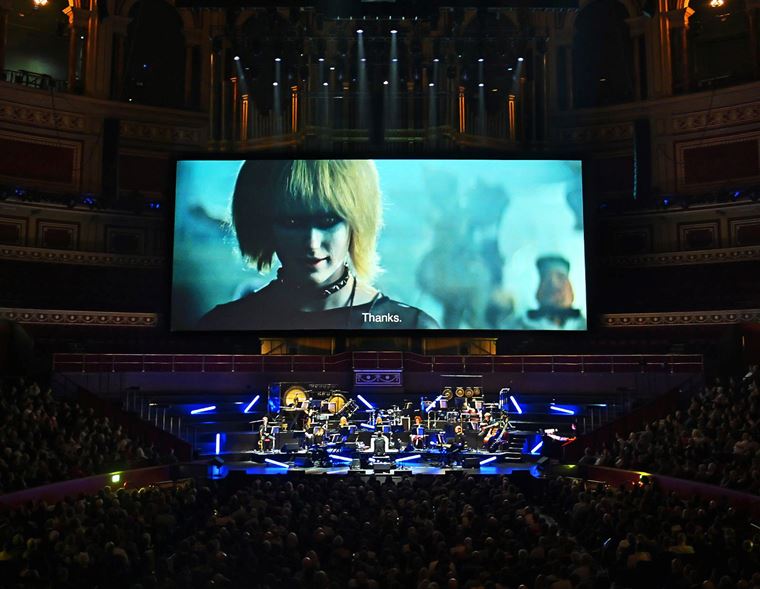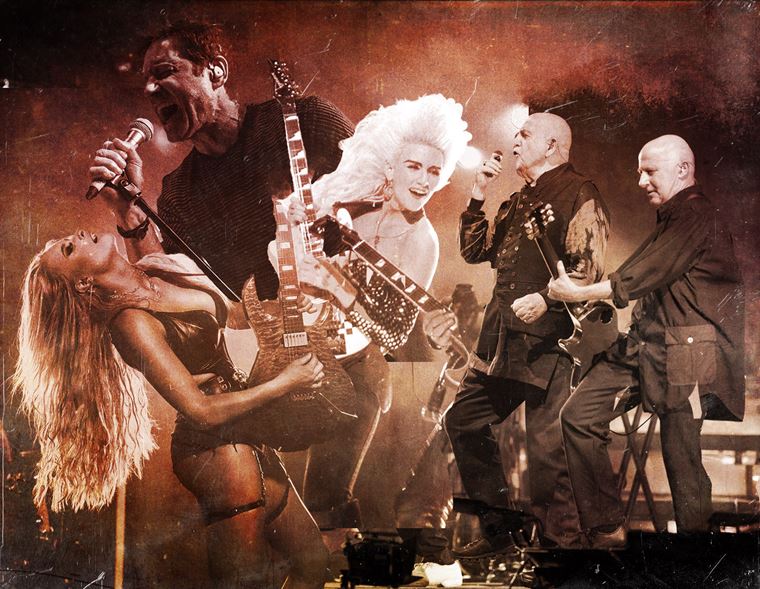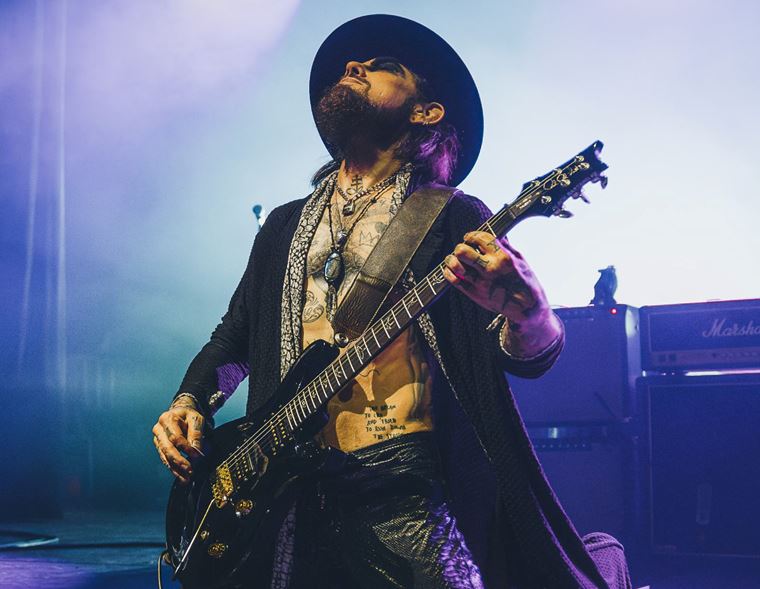CLUTCH EXCLUSIVE: Neil Fallon on Tom Waits, Sunrise on Slaughter Beach and Humour in Metal!
Clutch are the sort of band that remind you why you love rock music.
Neil Fallon’s singing voice is one of the greatest instruments on earth. Distinctive as hell, iconic and as powerful as a bulldozer, Fallon’s weapon of choice is the kind of sound that stops people in their tracks to say, ‘Who is that?’, before nodding along to his band’s infectious, buzzy grooves and propulsive energy.
Clutch are one of those bands that you couldn’t imagine sounding any other way than they do. Made up of equal parts swampy bayou, dusty Western and retro sci-fi B-movie, Clutch are a band steeped in a collective mythology and a barnload of dirty riffs. Since the early 90s, this quartet from Maryland have taken their highly energetic rock n roll church all over the world, setting up their pitch in town after town to deliver the good sermon that is hard rock to their adoring congregation.
It's a mighty sound. It’s loud and crunchy, with a swing and a swagger that distinguishes it on the heavy music horizon. Frontman Fallon is the crazed local preacher, the demented Captain Ahab aboard a ship coming right at you, his eyes bulging and his hair standing on end as he unleashes volley after volley of righteous rock energy, frazzling you with his nuclear voice.
Imagine going on stage after these guys? Forget it.
Like all other bands and human beings, the past two years have been an uncertain period for Clutch. The good news for us is that they took that strange limbo time of the pandemic and turned in one of their best ever records. Sunrise at Slaughter Beach is everything you’d want from the band and more. The established Clutch sound is most definitely there, but there’s a few new sounds and textures to enjoy along the way too, and a sense of lively energy that sees them writing and performing at the top of their game.
We very recently joined Neil on a Zoom call to discuss it all, whilst also taking in tips about how to get that vocal sound, how to write interesting lyrics and the enduring influence of Tom Waits…
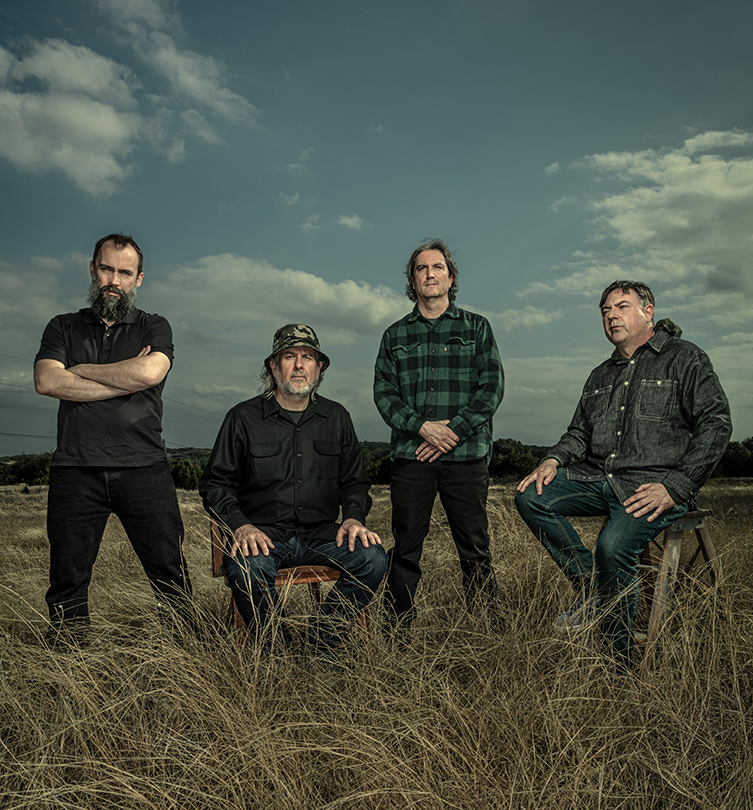
(Photo: Dan Winters)
Neil Fallon Interview
guitarguitar: Thank you for agreeing to talk to me today, I know you’re a busy man.
Neil Fallon: Hey, it’s my pleasure. Thanks for having me.
GG: So I’m interested in everything from the writing to the recording of the new record, as well as some guitar and vocal things if that’s cool with you?
NF: Yeah, that’s fine.
GG: Awesome! So, congratulations on Sunrise at Slaughter Beach, it’s a great record. The thing I probably love the most - and it’s a thing you guys are consistently great at - is the energy. There’s so much liveliness and energy in the recording. I wondered; is that a priority, to capture that feeling of a live band, even though that’s not necessarily how recordings are made?
NF: Yeah, I think so. I mean, our very first records were very much studio creations. For years, we were very adamant about performing songs live before recording them, but with Sunrise at Slaughter Beach, we couldn’t perform them live for obvious reasons. So, I think this was once again a studio creation but we wanted to be cognisant of the fact that we wanted to play these songs as if we were on stage.
GG: Did that affect your decisions about arrangements and so on?
NF: Yeah, I think sometimes if you write a riff and you’re very excited about it, you may wanna hear it 64 times in a row (laughs). But then, once you get used to it, you say, ‘maybe instead of doing it 64 times, maybe we should do it 8 times’. Y’know? Or even better, 4. I think sometimes in the creative process, it’s as much about what to leave out as it is to leave in.
GG: Definitely. And Clutch have a defined sound but I notice that each record has some degree of expansion from the last. On this new one, there’s things like the female vocals, the theremin, the keyboards…is that a conscious decision to push things a little bit? Or does it just kinda happen?
NF: I think it kinda happens. Sometimes we’ll be in the middle of writing and we say okay, we’ve written a half dozen real fast, upbeat ones. Now let’s try writing something that’s more moody or downtempo. Again, I think we’d been talking about doing backing vocals for the best part of twenty years but we were always reluctant because that meant possibly taking two more people out on the road with us, which is kind of a big deal. But this time around, we didn’t know if we were ever going back out on the road again, so it seemed like the perfect time to indulge these things and see what happened.
GG: Okay! And I’m thinking of the ideas, and who brings what to the studio. Is there an overall democratic attitude at play, say, if somebody disagrees with a song or a part? How does that stuff feel itself out?
NF: Um, usually what happens is, one of us comes in with a riff and then we’ll make a super rough arrangement, maybe come up with a chorus. Sometimes we discover that the verse is the chorus and the chorus is the verse. A lot of those things start revealing themselves once I start putting lyrics down, because the feel may change or the one (first beat of the bar - GG) may shift a little bit.
And if someone’s unhappy, it’s never confrontational, so it’s like ‘hey, I’m not really feeling this part. Can we try maybe adding a beat here and making it an odd time, or changing the key?’ When all is said and done, at least as far as the music goes, it’s very difficult to say who wrote what.
To me, it’s more exciting to have a creative journey as opposed to, like, being in a band where there’s that one guy who’s like, okay, here’s my song and it has to be performed this way. That’s almost dead-on-arrival, as far as creative satisfaction goes.

(Photo: Dan Winters)
GG: If you start writing a particular piece, is there an open-endedness there, like you’d deliberately not take it so far?
NF: Yeah, I think there’s always a…it keeps changing right up until the record button gets pushed. I’m constantly tweaking syllables. If we’re talking lyrics, there’s the grand concept: who’s in this song, what’s it about? Then you have to write a rhyme scheme about that, and then maybe move syllables around, or maybe this word is too big, or we need an extra something here. It’s a very fluid process.
GG: Right, that’s really interesting. One of the things I was interested in is one of those chicken and egg situations: if you guys are primarily a riff based band, does that mean that the vocal melodies come somewhere later down the line?
NF: Both. Usually, one of two things happens. John-Paul plays a beat and that’ll spontaneously inspire Tim or Dan to write a riff, or one of us comes with a riff, brings it to the table and John-Paul puts a beat to it. At that point, I might just kinda scat gibberish into the microphone.
But there are instances where I wrote lyrics well, well before they ever found a home in a song. An example for that is Jackhammer Our Names. That’s something I wrote, gosh, probably around 2016 or thereabouts? It was just, there was never a song that I felt was appropriate for the tone of the lyrics. I mena, those lyrics wouldn’t work on a song like X-Ray Visions, or what have you.
GG: Sure. And when you wrote those lyrics, for example, were they always destined to be song lyrics? Or do you write stuff that’s poetry, prose and other types or words that kind of live within journals? Like, stuff you can jump in and grab when you need lyrics?
NF: Um, yes to all that! The journals kinda look like something you might find in a psychiatric ward. Some of it’s very developed; that song in particular was a poem that was much longer, like 8 stanzas. I had to cut out a lot of it to make it fit the song, but sometimes it’s just one line that pops into my head and I’ll jot it down on my phone. I prefer to write on paper because then you can doodle in the margins. I think that’s an important part of the creative endeavour.
GG: Oh man, will we ever get to see these? Are you gonna publish these journals at any point?
NF: There’s no plans to do so! We’d definitely want to look at it first because a lot of it’s pretty illegible!
GG: Haha, fair enough. Now, one question I have has already been semi-answered, but I wouldn’t mind your take on it anyway. Do you ever compromise a good lyric for the sake of a melody that’s kind of overruling it? Or vice versa: do you ever sacrifice a really nice melody because the words you really want to fit, aren’t going to fit?
NF: That’s a very good question. I’ve learned that, you know, sometimes you can get married to an idea and an example on this album is Mercy Brown: the very first word is ‘jaundiced’. I wanted to put that word in the song, and when we went to go tracking it, I was like, ‘Am I really that married to the idea of the word ‘jaundiced’? It doesn’t really have that natural of a flow, and I think we kind of worked it out but ultimately these things are meant to be sung, so it shouldn’t read like some kind of literary dissertation. You have to kinda thread the needle and sometimes, you know, I think I tend to overwrite; I try to stuff too many words in there. I’ve been trying to write less but it’s hard.
GG: Sometimes the energy of the music requires that overabundance of words. You know the way that Jimmy Page would talk about the speed of his guitar solo, and how it’s not so much the individual notes that matter as much as the fact that they’re flying by really quickly that’s the main point of expression? Those kinds of rapid-fire vocals are one of the signature sounds of Clutch, aren’t they?
NF: Um, probably. It’s hard for me to be objective about it. I will say this, though: I think I’ve only recently - and when I say ‘recently’, I mean in the past ten years - kind of gotten a better understanding of pitch and melody. At the very beginning, I was unable to do that, whether it was because I was disinterested or I thought that was commercial or something stupid like that. So, I gravitated towards rhythm and hip-hop, like Chuck D, was something I sorta looked to. You don’t necessarily have to have a soaring, Robert Plant voice to get your point across if you can make an interesting counterpoint rhythm on top of the beat, or something that’s syncopated. That did a lot of heavy lifting for me for many years.
GG: That’s really interesting, because I don’t want to embarrass you by gushing, but you do have one of the most defining and brilliant rock voices of our generation. It’s like a supersonic force of nature, so it’s interesting that you were not thinking in terms of pitch back in the day!
NF: Well, thanks for saying that. I think a lot of it was fear, because we came from a punk rock - or at least I did - hardcore mentality where the idea of being cognisant of things like pitch and melody, I equated that with commercialism. In hindsight, that was a really naive notion. Then again, most of our notions when we’re still in our 20s are very naive. (laughs) I think one of the big things that changed it was when I finally got a four-track. I started singing multitracks of my own voice and I was like, wait a minute, now I can hear myself being sharp or hear myself being flat. That was sort of the beginning of it, and then 4, maybe 5 years ago, I finally took my first vocal lessons. I wish I’d done that 25 years ago, but it’s never too late to learn!
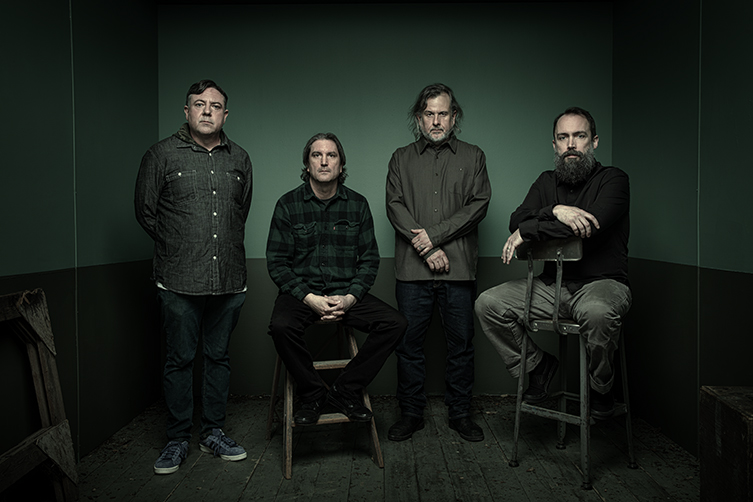
(Photo: Dan Winters)
GG: Wow! Now, I did want to ask about vocal warmups and how you look after your voice but this is interesting about the vocal lessons, given how proficient you already were. Did the teacher tell you that you were doing anything particularly wrong?
NF: No, the vocal lessons primarily focus on warmups, cause he - his name is Pete Strobel - he watched videos of me playing live, and he said, ‘you’re actually doing almost everything completely correctly’. Most of it has to do with breathing.
GG: Sure.
NF: Where you’re breathing, how you’re breathing. But when you sing as aggressively as I do, you have to be cognisant of how far you can push yourself night after night after night. But most of it - what we worked with together and I still do - has to do with warmups, which is something I only started to do in the past five years. It’s saved my ass, big time!
Then again, when I was in my twenties, I was smoking half a pack of cigarettes a day, you know? And then going out to the bar afterwards! (laughs) Then all of a sudden you hit 30, 35 and - well, I quit smoking 20 years ago - your body starts kinda tapping you on the shoulder, saying ‘hey, you know what? If you do this tonight, here’s how your body’s gonna be tomorrow’. So, you have to review your choices.
GG: Do you think, because you already have a gritty sounding voice, do you think the cigarettes and drink in your 20s enhanced it all and you’ve just been able to retain it since? Or do you reckon you might have sounded like that anyway?
NF: Y’know, I remember always wanting to sound like Tom Waits a lot.
GG: Hell yeah.
NF: And I don’t think I picked up those nasty habits in pursuit of that; it was probably gonna happen regardless if I was in a rock band or not. And it didn’t help, because rock ‘n’ roll not only permits those things but encourages it. At least back then it did. I’m glad that’s out of my life: I think if I had kind of instead said, if I want to pursue something, maybe instead of doing it through chemical indulgence, I’d do it with the seek of professional advice! Maybe it was pride, who knows?
GG: Haha, yeah! I’m a big Tom Waits fan, and I always wondered: you know how he always acted like an older man when he was younger? I wondered if that affectation became how he actually sounded, or whether it was a natural thing? It’s kind of impossible to know, isn’t it?
NF: Yeah, maybe he became the thing he was after, naturally. You have to be careful what you wish for! I remember distinctly, early on, trying to sound like I wasn’t 19, because I liked the sound of old blues guy’s voices. Those people get those voices by either being born with it, or it’s from the miles that you put on your voice.
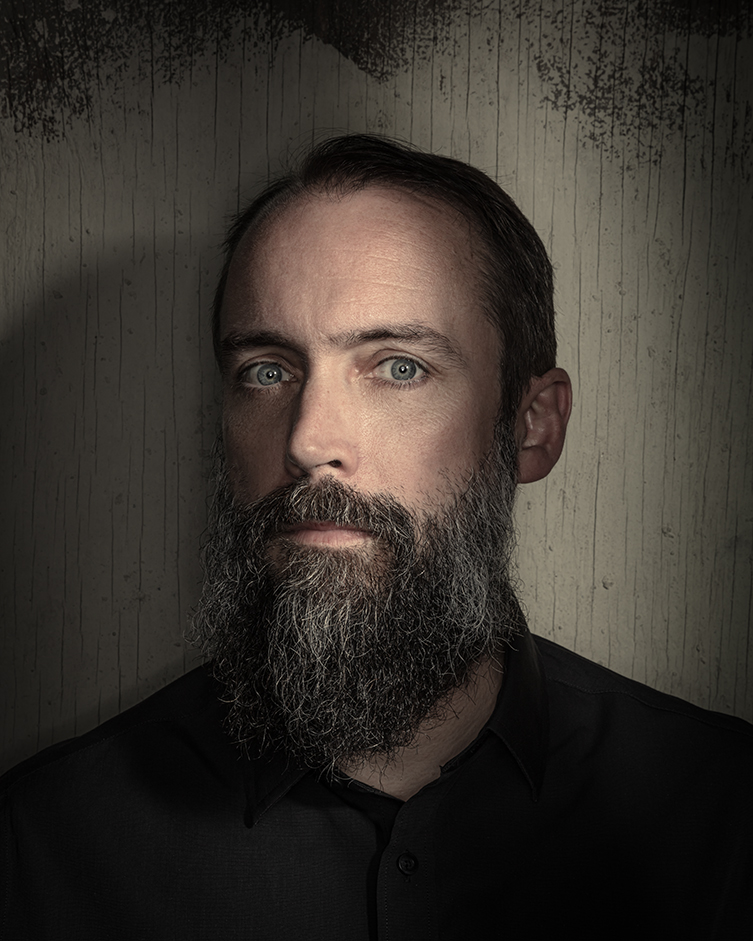
(Photo: Dan Winters)
GG: Yeah. So, one way or another, you’ve achieved it! One of my favourite things about Clutch is your vocals, and we’ll continue with that in a second but I’d like to get back to the lyrics for just a second. I don’t want to label it the wrong way or anything, but your lyrics are so interesting and diverse: it can include Greek Mythology, there can be Biblical stuff, there’s plenty of science fiction in there, and yet there something about it that’s cohesive and I suppose it’s the tone. I was wondering: do you aim for a specific type of tone, be it playful, or semi-serious? And with that, do you think that any subject is therefore good enough to write about if you have the angle?
NF: Well I have the advantage of always hearing the music instrumentally. And I think, like anyone else, instrumental music is a canvas where, if you close your eyes, suddenly there’s a little movie flickering in your head. Sometimes it’s really out of focus or really dim, but I think the lyricist’s job is to clear the window to that enough, so you can make out what’s going on. Usually, if the song is in minor, it’s not gonna have a lot of humour in it. But major can lend itself to humour, I think. Heavy metal, I like, but it tends to take itself way too damn seriously (laughs).
Stuff like biblical references are not because I’m a religious person, it’s because I think, like mythology, when you name drop something from there, suddenly you’ve infused your song with thousands of years of backstory, and all sorts of loaded images. If you say ‘medusa’ in a song, suddenly you have this picture in your head, and all the things that are associated with that, just by one word. So, I think mythology and biblical references kinda do the same job for a lyricist, or at least they can.
GG: Yeah, and ‘Medusa’ is gonna have the same connotations everywhere in the world, right?
NF: Yeah, it’s universal. That’s the thing. Sometimes I can make a reference like, let’s say a very specifically American thing may not be understood by someone in Germany, you know?
GG: Yes, totally.
NF: There’s plenty of references in, say, the Sleaford Mods, where I dunno what the hell they’re talking about half the time (laughs). But I love it! And I think that’s part of the joy: ‘Wow, that sounds awesome, I don’t know what he’s talking about’. So you have to be careful. I like regional affectations, but it’s important to always remember that, in this day and age, you can be global, so you want to be able to speak to everybody.
GG: Yeah! And one of the songs on the new record, Mercy Brown, is one we mentioned briefly a bit earlier. It reminds me of how much of a storytelling element seems to exist in your music. I bring this up with you because, more often than not these days, songs don’t tell stories and I think that angle for songwriters is so interesting, from the likes of Tom Waits and Bob Dylan, or whomever. I wondered if that was an important element in your writing?
NF: It’s a huge part, for me. I think there are songs where sometimes I look at what I’ve written and think, there’s no story here but it sounds good. And there’s an element of mystery, that sometimes the sonics of words are enough. That kind of song is going to be at the far end of what is the ‘lyrical’, in the classic sense, as opposed to narrative.
GG: Sure.
NF: But stories - and I think Tom waits was one of the first of those artists for me: I had a revelation when I heard Bone Machine, it was like each song was like a little movie. And it blew my mind. For me, it’s easier to sing a song with a story in it over and over and over again than a song that reads like a diary entry. There are plenty of artists who’ve made great songs based purely out of their emotions or their love life or their lost love and that’s all well and good, but I don’t know if I’d want to revisit that night after night after night. But I’m happy to sing about Medusa Monday through Sunday!
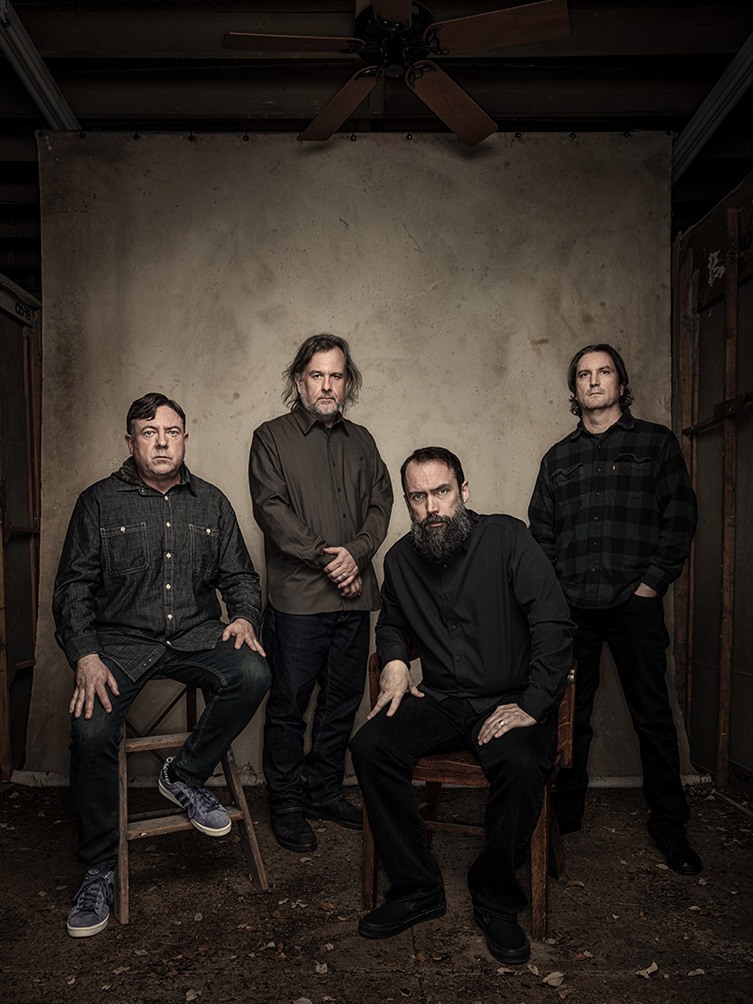
(Photo: Dan Winters)
GG: Haha, that’s a great quote right there! Now, I wondered if I could ask a little about those vocal warmups that we touched on, and then just a couple of questions about what types of guitars you’re using and such. So, Clutch are just about to start a huge tour in the UK and Europe, so what kind of things will you do to look after your voice?
NF: A lot of it’s what you don't do, and that’s like: don’t smoke cigarettes and don’t go out to the bar afterwards. Talk as little as possible; when there’s a day off, make it a real day off from everything. Uh, tons of water: I spend most of my tour going to the men’s room to piss. And listening to your body. I think sometimes singers will want to push as hard as they can to see how far they can get, and that’s not good.
But warmups: every day I do about 15-20 minutes of what’s called ‘head voice’ - probably more commonly known as falsetto - and it’s sort of scales, going (sings a short, simple up and down melody). It doesn’t sound anything like Clutch! What it does do is it works the vocal cords in such a fashion that’s like stretching before you run.
Occasionally, if my voice is really shot, I’ll sit down, put my elbows on my knees, hang my head and do what Pete, my instructor, calls ‘the dead guy’. You imagine yourself: you’re dead, and someone pushes down on your chest. What is that gonna sound like? And that’s kinda (makes zombie-like, low-pitched ‘uhh.--uhh’ sounds) What it does is it brings blood into the capillaries of your vocal cords and that accelerates the healing process.
GG: Oh cool, that’s handy!
NF: Yeah, it’s pretty interesting. And the other thing I do is I have a little nebuliser that I inhale saline mist from, just to moisturise the vocal cords, because tour buses are dehydration machines and you wake up feeling like a piece of beef jerky every morning. That’s basically it!
GG: That’s awesome! All of that is really helpful! Ok, so, just to round things off, let’s talk about guitars a little! I’ve seen Clutch a few times and it has always been Gibson Les Pauls that you’ve played. Is that still your favourite go-to guitar?
NF: Yeah. In the UK, we keep a lot of gear in Manchester, so we use the same guitars every time we roll through town. My favourite guitar that I’ve ever owned is a Gibson 335. That’s my favourite. The Les Paul Specials, I reserve for the slide guitar parts, just because it’s got a wider neck and I can fit my gorilla fingers in between the strings. So those are my favourite, and I have been playing a Fender of Skeletons on Mars, just because the effects pedals kinda require single coils.
GG: Is that a Telecaster or a Strat?
NF: It’s a Strat.
GG: Okay, interesting! And I’m sure you guys are mainly in standard tuning or drop-D. Is that how things remain?
NF: Primarily standard and drop-D, however, we have done our most wacky tunings of our career on this last record and that’s because we learned Black Sabbath’s Lord of This World and tuned down to C sharp. We liked the sound of it and so we said, well, let’s write some songs in C sharp! We have Boss Metal Zone and Nosferatu Madre in C sharp; we did some older songs like Monster Trucks in C sharp. There’s a couple of cross-tunings, like Regulator, Electric Worry and Gravel Road: those are open tunings.
GG: Those lower tunings would be well suited to your voice: the lower pitch must be a comfortable place to sit?
NF: I like opening sets in D (laughs). It’s a little easier, and yeah, it is easier to get up there. I don’t know why E standard is the agreed standard because that’s about as high as I can go.
GG: Haha, well I think your range has been pretty successful so far! So, just for fun: do you actually have a BOSS Metal Zone pedal in your touring rig?
NF: (pause) Uh, no. (laughs) I know that sounds disappointing, but we didn’t even track with one! But maybe it warrants it.
Maybe so! Our time was sadly up at that point, so we’ll just need to wait and see if that famously divisive BOSS pedal ever makes its way onto his or Tim’s pedal board!
Neil was great to talk to, with that characteristic sense of dry humour coming through in spades. In our brief 30 minutes, he took us on a wide and detailed journey, and we’re grateful for it. As a long-time fan of the band, I’d been looking forward to this one, and I’m glad to say that Neil didn’t disappoint!
Clutch are touring very soon, starting in Glasgow on the 11th November. The tour takes them to Europe and then back to the UK again, so head over to the official Clutch website for all your ticket, music and merch needs.
We’d like to thank Neil for giving us some time in his busy schedule, and to Kirsten for setting us up.
Thanks, as ever, to you for reading this exclusive interview! For more, please click through to our guitarguitar interviews page, where over 150 exclusive interviews await!
See you next time!


